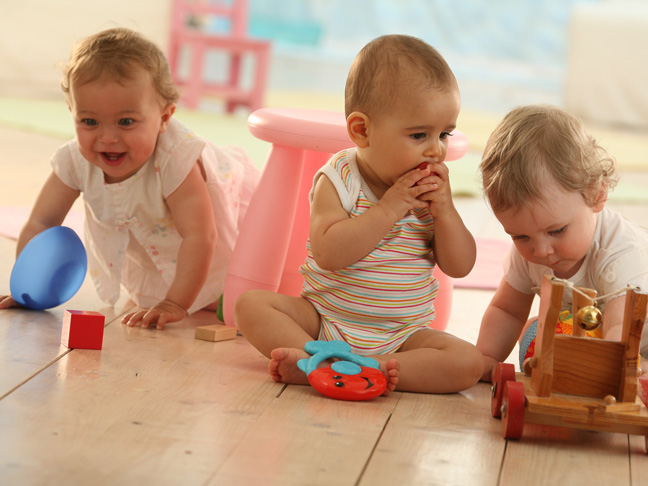Parents often tell me that their children are sick all the time once they start daycare. Although my children have never gone to daycare, I had a similar experience when my two older boys started preschool. It was rough! And here’s the thing: Once your child is at the point where she’s around a large group of children, either at daycare or preschool, it’s not uncommon for her to get 8 to 12 viral illnesses in a year — which, yes, can feel like she’s sick constantly. The good news, however, is that while a Canadian study found that toddlers who attend daycare do get sick more often than toddlers who stay home, those same children got sick less often in elementary school than their peers who didn’t go to daycare. Until your child gets to that point, though, there are definitely things that you can do to help protect her good health, whether she’s in daycare, or about to start school.
1. Choose a “healthy” daycare or preschool. Make sure to visit before you enroll your child and observe the procedures in place to prevent the spread of germs. For example, it’s a good idea for daycares to have sinks in every room for thorough hand washing, with a separate sink for food prep. Food should be handled away from bathrooms and diaper changing areas. Bonus points if you see someone disinfecting toys while you’re there.
2. Ask the right questions. How often toys are cleaned? Guidelines from the American Academy of Pediatrics suggest that every time a child puts a toy in his mouth, it should be set aside and cleaned. How often do employees wash their hands? The answer should be often and anytime their hands are dirty, including when employees arrive, before they handle food, after they feed children, after they use the bathroom, after they change a diaper, and after they wipe a child’s nose or clean a cut. Most importantly, find out what the policy is when children get sick. When are they sent home? When are they allowed to return? Children should not go back to daycare until they are fever-free for 24 hours, and haven’t had any diarrhea or vomiting for at least that long. Any communicable rashes, such as scabies or pinworms, need to be treated before children return to daycare, too.
3. Make sure your child is getting enough sleep. When children are run down and not sleeping well, they are more likely to get sick. Make sure you are following the recommended guidelines for sleep and that your daycare center is putting your child down for naps regularly, if naptime is appropriate for his age.
4. Give your child plenty of healthy foods. She should be eating plenty of fruits and vegetables; foods with natural antioxidants such as berries, broccoli, tomatoes, mango, and papaya, are always a great choice. Foods with vitamin A, such as pumpkin and sweet potatoes, as well as foods that are good sources of zinc such as oysters, beef, beans, and mushrooms, may be helpful in preventing the spread of disease.
5. Immunize your child, and schedule regular check-ups with his pediatrician. These simple things can help prevent some common childhood illnesses. If your child is 6-months-old (or older) and attends daycare, be sure that he gets his flu shot early and yearly (you should, too).
6. Make probiotics part of your child’s life. I give my children probiotics to help shorten the severity and duration of diarrhea. Yogurt with live cultures is a great source of calcium and probiotics. If your child is allergic to dairy (or doesn’t like it), try an over-the-counter probiotic powder. You can add it to their water or pureed food. There are studies that suggest probiotic use during an acute episode of diarrhea can shorten the severity and duration of the diarrheal illness; so, in my opinion, there is little downside to probiotic use especially when consumed in yogurt.
Bottom line: Kids will get sick sooner or later. Even the healthiest kids will get sick from time to time. Do your best to choose a daycare center with good prevention procedures and sick policies and try the other tips that I’ve mentioned. Luckily, with a little TLC, most viral illnesses will only last a few days and kids will be back to themselves in no time.
More from Deena Blanchard:
- How Much Sleep Do Kids Need? A Definitive Guide
- Fevers: Everything You Need to Know (+ Myths to Ignore)
- Secondary Drowning: How to Recognize the Signs
Photo: Getty








